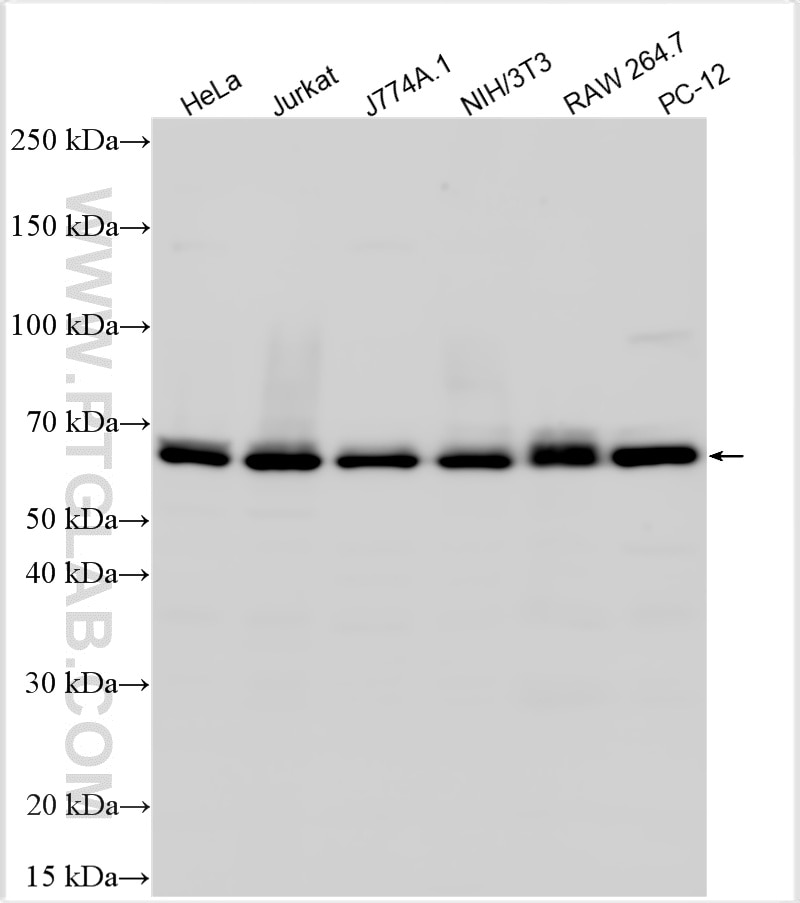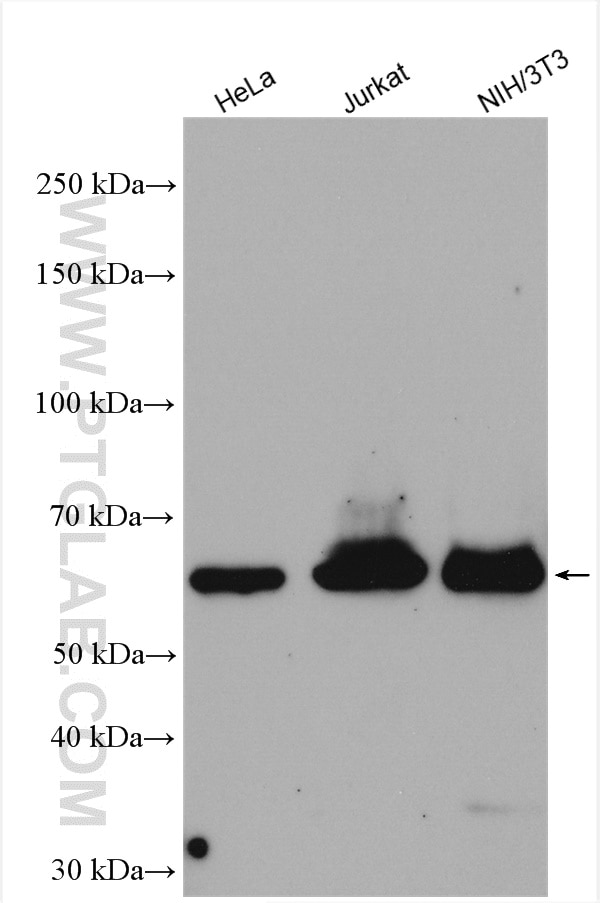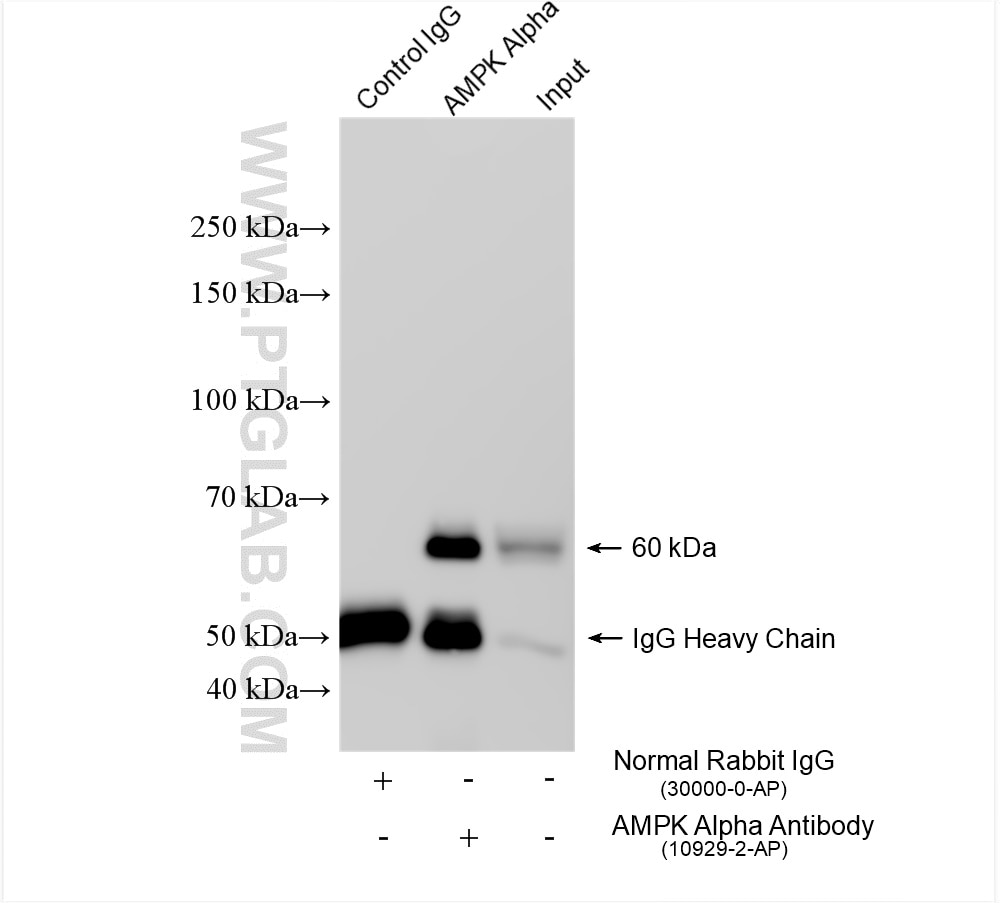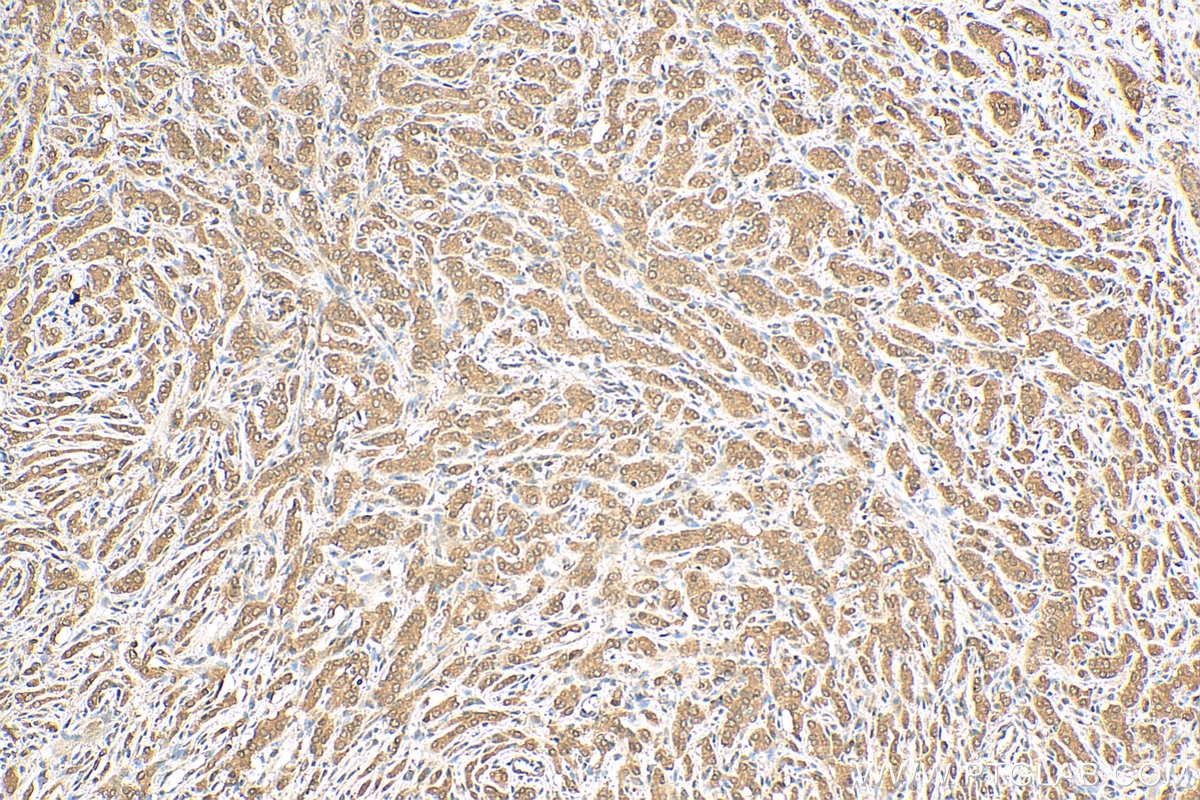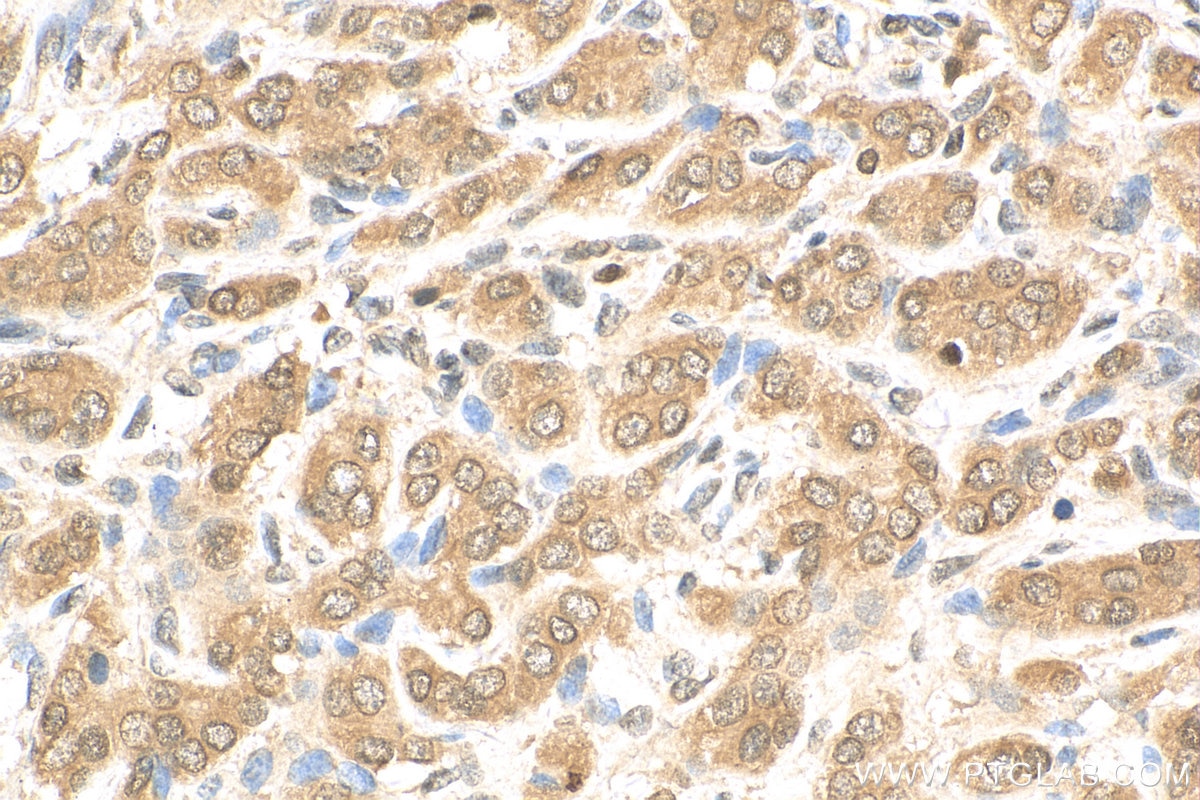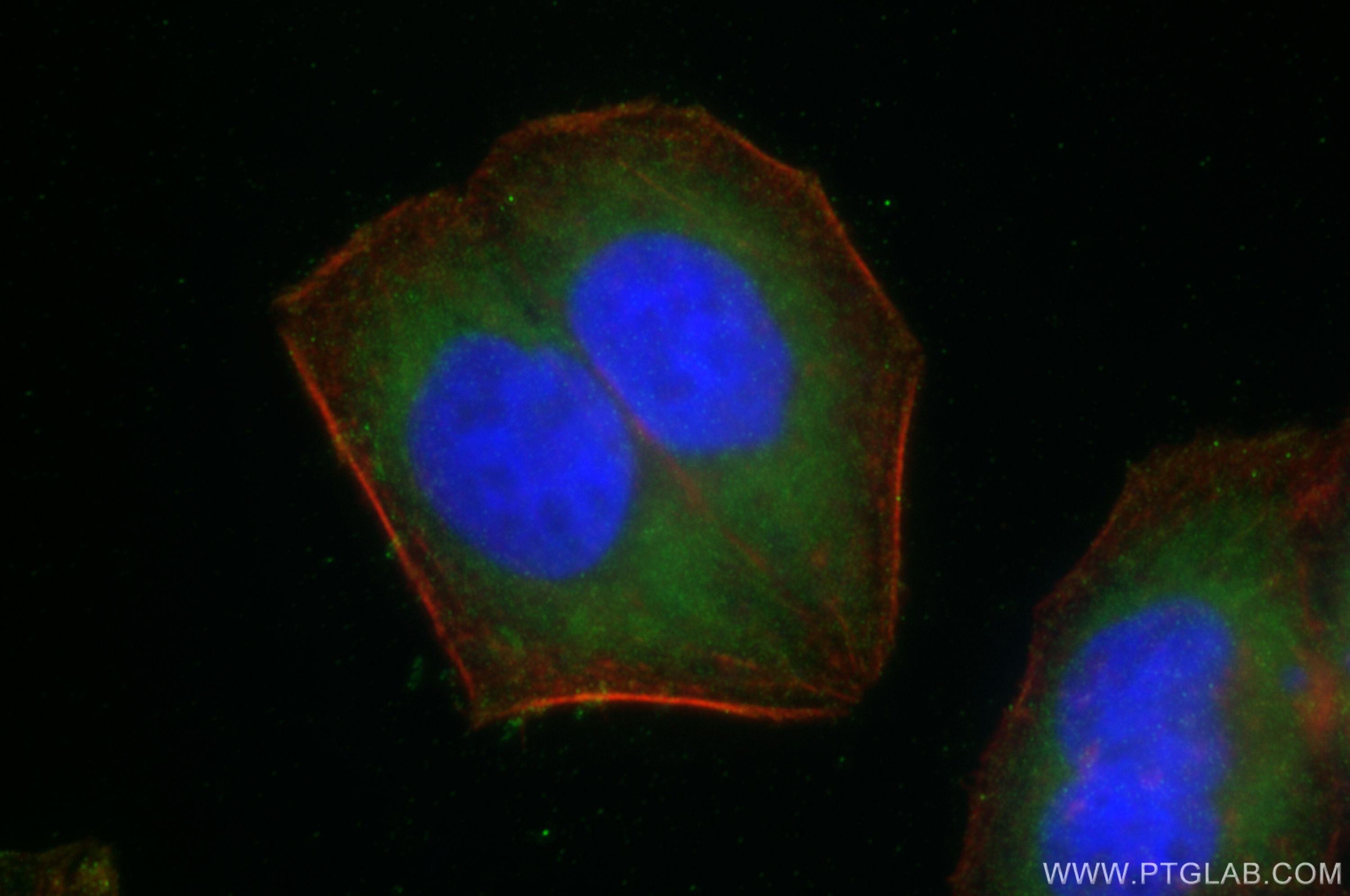Tested Applications
| Positive WB detected in | HeLa cells, Jurkat cells, NIH/3T3 cells, J774A.1 cells, RAW 264.7 cells, PC-12 cells |
| Positive IP detected in | HeLa cells |
| Positive IHC detected in | human prostate cancer tissue Note: suggested antigen retrieval with TE buffer pH 9.0; (*) Alternatively, antigen retrieval may be performed with citrate buffer pH 6.0 |
| Positive IF/ICC detected in | HepG2 cells |
Recommended dilution
| Application | Dilution |
|---|---|
| Western Blot (WB) | WB : 1:5000-1:50000 |
| Immunoprecipitation (IP) | IP : 0.5-4.0 ug for 1.0-3.0 mg of total protein lysate |
| Immunohistochemistry (IHC) | IHC : 1:50-1:500 |
| Immunofluorescence (IF)/ICC | IF/ICC : 1:200-1:800 |
| It is recommended that this reagent should be titrated in each testing system to obtain optimal results. | |
| Sample-dependent, Check data in validation data gallery. | |
Published Applications
| KD/KO | See 12 publications below |
| WB | See 296 publications below |
| IHC | See 7 publications below |
| IF | See 10 publications below |
| IP | See 3 publications below |
Product Information
10929-2-AP targets AMPK Alpha in WB, IHC, IF/ICC, IP, ELISA applications and shows reactivity with human, mouse, rat samples.
| Tested Reactivity | human, mouse, rat |
| Cited Reactivity | human, mouse, rat, pig, rabbit, zebrafish, goat, fish, carp |
| Host / Isotype | Rabbit / IgG |
| Class | Polyclonal |
| Type | Antibody |
| Immunogen |
CatNo: Ag1367 Product name: Recombinant human AMPK alpha protein Source: e coli.-derived, PGEX-4T Tag: GST Domain: 1-207 aa of BC012622 Sequence: MATAEKQKHDGRVKIGHYILGDTLGVGTFGKVKVGKHELTGHKVAVKILNRQKIRSLDVVGKIRREIQNLKLFRHPHIIKLYQVISTPSDIFMVMEYVSGGELFDYICKNGRLDEKESRRLFQQILSGVDYCHRHMVVHRDLKPENVLLDAHMNAKIADFGLSNMMSDGEFLRTSCGSPNYAAPEVISGRDCNIIRILTSQFTNYQH Predict reactive species |
| Full Name | protein kinase, AMP-activated, alpha 1 catalytic subunit |
| Calculated Molecular Weight | 63 kDa |
| Observed Molecular Weight | 64 kDa |
| GenBank Accession Number | BC012622 |
| Gene Symbol | AMPK Alpha 1 |
| Gene ID (NCBI) | 5562 |
| RRID | AB_2169568 |
| Conjugate | Unconjugated |
| Form | Liquid |
| Purification Method | Antigen affinity purification |
| UNIPROT ID | Q13131 |
| Storage Buffer | PBS with 0.02% sodium azide and 50% glycerol, pH 7.3. |
| Storage Conditions | Store at -20°C. Stable for one year after shipment. Aliquoting is unnecessary for -20oC storage. 20ul sizes contain 0.1% BSA. |
Background Information
The mammalian 5-prime-AMP-activated protein kinase (AMPK) appears to play a role in protecting cells from stresses that cause ATP depletion by switching off ATP-consuming biosynthetic pathways. PRKAA1 is also named as AMPK1, ACACA kinase, HMGCR kinase. It is a mammalian homologue of sucrose non-fermenting protein kinase (SNF-1), which belongs to a serine/threonine protein kinase family. It has 2 isoforms with molecular mass of 63-66 kDa produced by alternative splicing.10929-2-AP can recognize both AMPK Alpha 1 and AMPK Alpha 2.
Protocols
| Product Specific Protocols | |
|---|---|
| IF protocol for AMPK Alpha antibody 10929-2-AP | Download protocol |
| IHC protocol for AMPK Alpha antibody 10929-2-AP | Download protocol |
| IP protocol for AMPK Alpha antibody 10929-2-AP | Download protocol |
| WB protocol for AMPK Alpha antibody 10929-2-AP | Download protocol |
| Standard Protocols | |
|---|---|
| Click here to view our Standard Protocols |
Publications
| Species | Application | Title |
|---|---|---|
Signal Transduct Target Ther Glibenclamide targets MDH2 to relieve aging phenotypes through metabolism-regulated epigenetic modification | ||
Adv Sci (Weinh) Mitigating Doxorubicin-Induced Cardiotoxicity and Enhancing Anti-Tumor Efficacy with a Metformin-Integrated Self-Assembled Nanomedicine | ||
Adv Sci (Weinh) POSTN-Mediated Interplay of M1 Polarized Macrophage with Tendon-Derived Stem Cells to Drive Traumatic Heterotopic Ossification Formation through PTK7/ATK Signaling | ||
Autophagy Periplocin suppresses the growth of colorectal cancer cells by triggering LGALS3 (galectin 3)-mediated lysophagy | ||
Autophagy The AMPK-MFN2 axis regulates MAM dynamics and autophagy induced by energy stresses.
|
Reviews
The reviews below have been submitted by verified Proteintech customers who received an incentive for providing their feedback.
FH Mallikarjun (Verified Customer) (02-04-2026) | Works very well
|
FH MANOBENDRO NATH (Verified Customer) (11-07-2025) | Excellent antibody!
|
FH MANOBENDRO NATH (Verified Customer) (10-09-2025) | Very nice antibody.
 |
FH Nishita (Verified Customer) (09-12-2025) | Worked pretty well, but we had to use a more concentrated dilution than the one recommended by the site.
|
FH Priya (Verified Customer) (10-03-2024) | Used this antibody for colon carcinoma cell line and mice tissue
|
FH Charlotte (Verified Customer) (08-15-2024) | Done in milk but got quite some background. I tried in seablock but not sure it helps. Otherwise nice antibody with one intense band at the expected MW
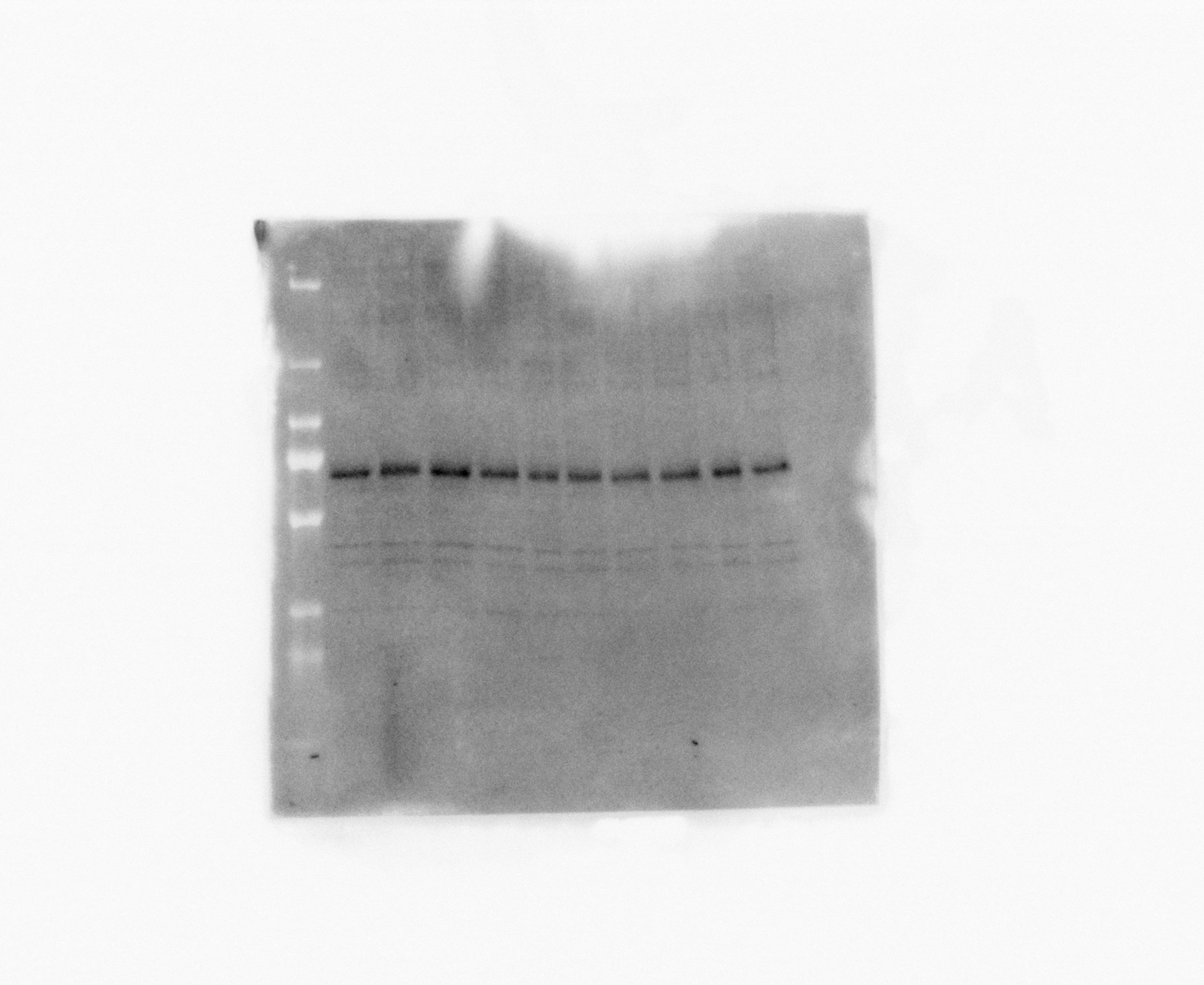 |
FH Priya (Verified Customer) (06-21-2023) | Used this antibody for Caco2 cells andmice tissue
|
FH Priya (Verified Customer) (06-21-2023) | Used this antibody for Caco2 cells andmice tissue
|
FH LUNFENG (Verified Customer) (01-27-2020) | GOOD
|
FH Jing (Verified Customer) (01-27-2020) | tested in mouse heart lysate, with clear single band around 60 kd.
|
FH Jie (Verified Customer) (01-27-2020) | showed a single band at the correct size with mouse heart tissue section
|
FH Yan (Verified Customer) (01-03-2020) | We tested this antibody in mouse heart tissue extract. It worked very well and showed a single band around 60kDa.
|

